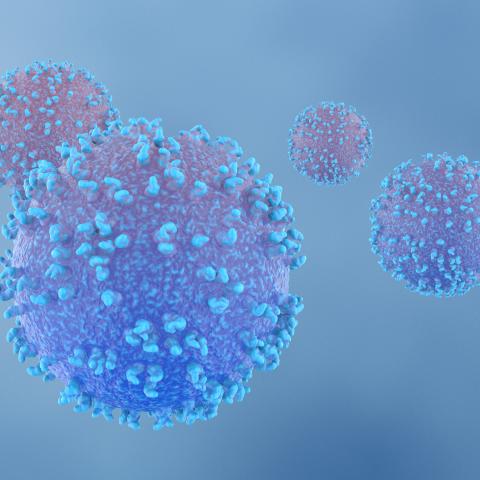
An illustration of an immune cell. New findings by Dr. Mohamed Elsherif Badr and colleagues uncover surprising insights into the growth and development of these important, cancer-fighting cells.
A new study in mice shows that immature immune cells that can attack a person’s own tissues, known as autoreactive cells, are released into peripheral parts of the body where they can develop into healthy immune cells. This surprising finding disproves the previous general belief that these immune cells were eliminated before leaving the thymus. The results, published November 4, 2023, in Science, hold important implications for our understanding of autoimmune diseases and cancer.
The thymus is an organ in the chest that harbors our developing immune cells until they reach maturity and are released into the bloodstream, at which point they target and kill cancer cells or other harmful pathogens. However, sometimes these immune cells, including CD8 T cells, can be formed incorrectly or mutated, causing autoimmune diseases when they mistakenly target a person’s own tissues instead.
“For a very long time, scientists thought that the thymus would stop the T cells that cause autoimmune diseases by killing them before they can leave the thymus,” explains Mohamed Elsherif (Sherif) Badr, Ph.D., a Research Fellow in the Experimental Immunology Branch who was involved in the recent study. “But we found that, in fact, those autoreactive cells are not dying in the thymus.”
In their mouse study, Badr and his colleagues were surprised to find that some developing T cells can leave the thymus before reaching maturity. Follow-up experiments confirmed that the immature cells that were “evicted” from the thymus were autoreactive. Yet when the researchers tracked these evicted cells over time, they found that the cells ended up maturing into healthy, non-autoreactive CD8 T cells.
The research team theorizes that by releasing these premature immune cells from the thymus into other tissues, the cells are exposed to normal proteins in the body and are thus trained in a way to not react to healthy cells.
Moving forward, Badr says, “We would like to investigate why these immune cells are becoming tolerant outside of the thymus, how to harness them to treat autoimmune diseases, or how to activate them in the context of cancers.”
Alfred Singer, M.D., Chief of the Experimental Immunology Branch who oversaw the study, notes that because CD8 T cells are critical immune cells for combating cancer, it is very possible that cancer-fighting T cells are coming from this pool of evicted, immature CD8 T cells. “We think this is potentially an important and generally applicable finding,” he says. “We’re excited about it.”